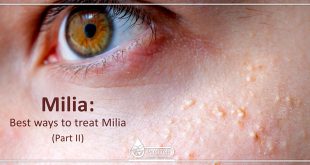How is eczema diagnosed?
To diagnose eczema, doctors rely on a thorough physical examination of the skin as well as the patient’s account of the history of the condition. In particular, the doctor will ask when the condition appeared, if the condition is associated with any changes in the environment or contact with certain materials, and whether it is aggravated in any specific situations. Eczema may have a similar appearance to other diseases of the skin, including infections or reactions to certain medications, so the diagnosis is not always simple. In some cases, a biopsy of the skin may be taken in order to rule out other skin diseases that may be producing signs and symptoms similar to eczema.
If a doctor suspects that a patient has allergic contact dermatitis, allergy tests, possibly including a skin “patch test,” may be carried out in an attempt to identify the specific trigger of the condition.
There are no laboratory or blood tests that can be used to establish the diagnosis of eczema.
What is the treatment for eczema?
The goals for the treatment of eczema are to prevent itching, inflammation, and worsening of the condition. Treatment of eczema may involve both lifestyle changes and the use of medications. Treatment is always based upon an individual’s age, overall health status, and the type and severity of the condition.
Keeping the skin well hydrated through the application of creams or ointments (with a low water and high oil content) as well as avoiding over-bathing (see “Can eczema be prevented?” section) is an important step in treatment. Lifestyle modifications to avoid triggers for the condition are also recommended.
Corticosteroid creams are sometimes prescribed to decrease the inflammatory reaction in the skin. These may be mild-, medium-, or high-potency corticosteroid creams depending upon the severity of the symptoms. If itching is severe, oral antihistamines may be prescribed. To control itching, the sedative type antihistamine drugs (for example, diphenhydramine [Benadryl], hydroxyzine [Atarax, Vistaril], and cyproheptadine) appear to be most effective.
In some cases, a short course of oral corticosteroids (such as prednisone) is prescribed to control an acute outbreak of eczema, although their long-term use is discouraged in the treatment of this non life-threatening condition because of unpleasant and potentially harmful side effects. The oral immunosuppressant drug cyclosporine has also been used to treat some cases of eczema. Ultraviolet light therapy (phototherapy) is another treatment option for some people with eczema.
Finally, two topical (cream) medications have been approved by the U.S. FDA for the treatment of eczema: tacrolimus (Protopic) and pimecrolimus (Elidel). These drugs belong to a class of immune suppressant drugs known as calcineurin inhibitors. In 2005, the FDA issued a warning about the use of these drugs, citing studies in animals that showed a possible association between use of these drugs and the development of certain types of cancer. It is recommended that these drugs only be used as second-line therapy for cases that are unresponsive to other forms of treatment, and that their use be limited to short time periods, and the minimum time periods needed to control symptoms. Use of these drugs should also be limited in people who have compromised immune systems.
 Parsi Teb Physical and Mental Health Journal
Parsi Teb Physical and Mental Health Journal 



